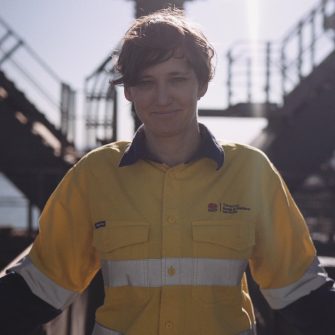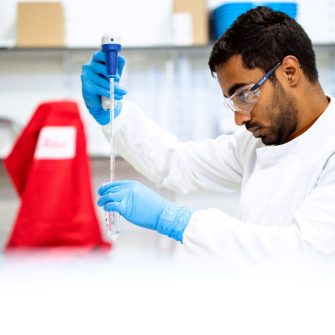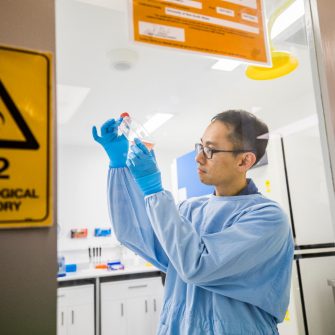Master of Engineering Science (Water, Wastewater and Waste Engineering)
- Commencing Terms
- Term 1, 2 & 3
- Duration
- 1 - 2 Year(s)
- Delivery Mode
- Face-to-face (includes blended)
- Campus
-
Kensington
- Codes
- Program code 8338
- CRICOS code 084282A
-
Commonwealth Supported Places are available for this program2026 Indicative CSP first year fee
- $9,500*
-
2026 Indicative CSP fee to complete degree
- $19,000*
-
2026 Indicative first year full fee
- $61,000*
-
2026 Indicative full fee to complete degree
- $127,000*

Application closures for 2026
International applications for all undergraduate programs, as well as postgraduate programs offered by the faculties of Arts, Design & Architecture, Engineering (excluding Master of Information Technology and associated programs) and Science are now closed to New Overseas Student Commencement (NOSC) for 2026 intakes.
Postgraduate programs offered by the Business School and the faculties of Law & Justice and Medicine & Health remain open. Master of Information Technology (and associated programs) also remain open.
- Overview
- Entry requirements
- What will I study?
- Future careers
- How to apply
- Fees & Scholarships
Overview
UNSW Master of Engineering Science in (Water, Wastewater and Waste Engineering) is a 2-year full-time postgraduate degree that promotes flexible learning at Australia’s leading engineering faculty. It’s designed for students who already have a four-year accredited engineering degree and want to broaden their job prospects through cross training, re-training or specialisation.
Water, like many natural resources, is the lifeblood of individuals and communities across the world. Effective and sustainable water and wastewater treatment are crucial for urban populations as well as environmentally responsible waste management. If you’re an engineer or professional interested in expanding your knowledge and skills in the area, this degree will cover current and future technologies for water usage, wastewater treatment and waste disposal. In this degree you’ll learn the fundamentals of current practices in this field and engage with existing and future technologies ensuring your degree is relevant today and tomorrow.
This is a non-accredited degree and does not offer industrial training.
Why study at UNSW?
Engineering is increasingly relying on creating human solutions for problems at the intersection of the natural and human world. When you possess expertise in water and wastewater you can shape positive futures for individuals and communities alike. We’re committed to shaping a more prosperous, safe and just society, with an emphasis on sustainability and consideration of engineering impacts.
This degree is taught through the School of Civil and Environmental Engineering, at UNSW Engineering. As a global top 20 university (QS World University Rankings, 2026), we’re guiding the future leaders of science and engineering in Australia and overseas. We're also ranked #4 in Australia (Academic Ranking of World Universities (ARWU), 2024).
- We offer a constantly expanding network of engineering industry contacts and partnerships
- We’re leaders in research and teaching excellence both locally and internationally
- We're ranked #1 in Australia and #25 globally for Engineering and Technology. As well as this, all of UNSW's Engineering schools are ranked in the global top 50 with two schools ranked in the global top 10 for Engineering subjects (QS World University Rankings by Subject, 2025)
- We're known as the leading Civil and Environmental Engineering school ranked #1 in Australia for Civil and Structural Engineering (QS World University Rankings by Subject, 2025)
- Each year our researchers work with over 100 industry and government organisations on industry and community related projects
- Our Alumni are consistently high contributors to Engineers Australia’s Top 100 list of Most Influential Engineers
- UNSW is known for its graduate employability, with UNSW awarded the Most Employable students for six years in a row (Australian Financial Review (AFR) Top100 Future Leaders Awards, 2020–2025)
- Our academic staff are recognised world leaders in their fields of expertise
We’re Australia’s leading researchers in the development of all aspects of water technology from surface and groundwater studies to water quality and hydraulics. You’ll study in state-of-the-art laboratories including the Water Research Laboratory. This world-leading research organisation tackles the most challenging water engineering problems faced by the world today.
Based on Sydney’s Northern Beaches the laboratory spans four hectares and is home to state-of-the-art facilities, equipment and leading minds in their areas of research and industry.
Want to see more from UNSW Engineering?
Entry requirements
This Master of Engineering Science specialisation accepts students from any engineering discipline.
Entry into the Master’s program requires completion of a 4-year Bachelor of Engineering degree (or equivalent) or 3-year Engineering Science degree in any engineering discipline. A minimum 65% average, or its equivalent, throughout the qualifying bachelor’s degree is mandatory.*
*Qualifications from non-211 Chinese Universities will require a 70% average
Recognition of Prior Learning (Credit Transfer)
Recognition of Prior Learning is the transfer of credit towards your program from previous study. If you have relevant previous study experience, you may be eligible for credit points that would enable you to complete your Master of Engineering Science in as little as one year, or another accelerated option listed below dependent on your previous study.
-
A 4 year Bachelor Degree with honours (AQF Level 8 equivalent) from any institution from any engineering discipline.
-
A 4 year Bachelor Degree with honours (AQF Level 8 equivalent) from any institution in any engineering discipline.
-
A 3 year Bachelor Degree (AQF Level 7 equivalent) from any institution from any engineering discipline.
English language requirements
You may be asked to provide evidence of your English proficiency to study at UNSW depending on your educational background and citizenship. English language skills are vitally important for coping with lectures, tutorials, assignments and examinations - this is why UNSW requires a minimum English language competency for enrolment.
If you’re completing an Australian Year 12 qualification (e.g. NSW HSC or equivalent), you do not need to provide anything extra to prove your proficiency. Your qualification will be used as evidence of your English proficiency.
If you do need to provide evidence of your English proficiency, this will be indicated in your application. You can prove this by providing evidence that you meet one or more of the following criteria:
- English language tests and university English courses
- Prior study in the medium of English
- Other qualifications
If you need to improve your English skills before you start your degree, UNSW College’s Academic English Programs are for you. The programs are suitable for various English levels and help you prepare for university studies and life in Australia.
For more details, visit the English Language Requirements page.
This Master of Engineering Science specialisation accepts students from any engineering discipline.
Entry into the Master’s program requires completion of a 4-year Bachelor of Engineering degree (or equivalent) or 3-year Engineering Science degree in any engineering discipline. A minimum 65% average, or its equivalent, throughout the qualifying bachelor’s degree is mandatory.*
*Qualifications from non-211 Chinese Universities will require a 70% average
Recognition of Prior Learning (Credit Transfer)
Recognition of Prior Learning is the transfer of credit towards your program from previous study. If you have relevant previous study experience, you may be eligible for credit points that would enable you to complete your Master of Engineering Science in as little as one year, or another accelerated option listed below dependent on your previous study.
-
A Bachelor Degree with Honours or AQF Level 8 equivalent from any institution in a cognate discipline.
-
A 4 year Bachelor Degree with honours (AQF Level 8 equivalent) from any institution in any Engineering discipline.
-
A 3 year Bachelor Degree (AQF Level 7 equivalent) from any institution from any engineering discipline.
Admission pathways
If you do not meet the requirements for direct entry into your chosen degree, you may be eligible for a pathway program with UNSW College. UNSW College provides alternative entry options using university-approved content so that you can start your UNSW journey with confidence.
English language requirements
You may be asked to provide evidence of your English proficiency to study at UNSW depending on whether you are from an English-speaking background or non-English speaking background. English language skills are vitally important for coping with lectures, tutorials, assignments and examinations - this is why UNSW requires a minimum English language competency for enrolment.
If English is not your first language, you’ll need to provide proof of your English proficiency before you can be given an offer to study at UNSW. You can do this by providing evidence that you meet one or more of the following criteria:
- English language tests and university English courses
- Prior study in the medium of English
- Other qualifications
If you need to improve your English skills before you start your degree, UNSW College’s Academic English Programs are for you. The programs are suitable for various English levels and help you prepare for university studies and life in Australia.
For more details, visit the English Language Requirements page.
Check the specific English language requirements for this program
What will I study?
UNSW is introducing a new academic calendar from 2028.
We are moving to a new flex-semester calendar. What does this mean for your studies?
Program structure
When you choose to study a Master of Engineering Science, you’ll choose from one of 26 specialisations which will help you make your next career move.
Within these specialisations your study will include:
- Enquiry-based courses
- Disciplinary courses
- Engineering and Technical Management Courses.
You’ll be able to tailor your degree to your interests by combining courses in your chosen specialisation with elective courses.
You’ll also have the chance to work on a complex, open-ended enquiry-based research project.
Full program structure
Degree structures can vary depending on your specialisation of choice, the number of courses you choose and timetabling, to give you an indication you can consider the below.
Depending on your specialisation and your previous studies/professional experience you may study:
- At least 4 Disciplinary Courses
- At least 4 Advanced Disciplinary Courses
- At least 1 Engineering and Technical Management Course
- At least 3 enquiry-based courses (which includes a research project)
- At least 4 elective courses (across Disciplinary, Advanced Disciplinary and Engineering and Technical Management courses)
Through the Disciplinary and Advanced Disciplinary Knowledge courses you’ll learn the technical knowledge and skills you need for your chosen specialisation. You’ll also update your knowledge in cutting-edge developments in your area of interest.
Engineering and Technical Management courses help you build skills in communicating and justifying professional decisions, employing ethical approaches to practice, and developing the abilities required for roles more focused on project and or staff management, leadership and strategy.
You’ll complete a research project in this degree within the enquiry-based courses. In this you can choose to develop your Postgraduate Research skills to assist with the research project component of the degree or as your first step towards a Higher Degree Research (PhD) program. Or you can complete a “Launching a Startup” course where you will be equipped with the skills necessary to successfully commercialise your ideas.
Future careers
Water is a key natural resource that plays a crucial role in our daily lives. Graduates of this degree have many professional opportunities available to them including becoming a Water Treatment Specialist with a public water utility like Sydney Water or a consulting company. You could also pursue a role as an Environmental Engineer managing water and waste issues for a mining company. The degree will give you the skills to engineer and design water infrastructure.
Career opportunities include roles in:
- Coastal, ocean and estuarine engineering and management
- River flow, floodplain management and catchment hydrology
- Groundwater research and management
- Civil engineering hydraulics
- Offshore renewable energy
- Environmental studies and climate change adaptation
- Wetland Restoration
UNSW Engineering graduates are some of the most sought-after professional engineers in Australia and abroad thanks to the reputation of our research and teaching.
How to apply
Applications must be submitted through our Apply Online portal. We encourage you to submit your completed application as early as possible to ensure it will be processed in time for your preferred term. Some high-demand programs and Faculties with limited places may have an earlier application deadline or commencement date. Find out more.
Ready to start your application?
For most international students, applications are submitted via our Apply Online service. We encourage you to submit your completed application as early as possible to ensure it will be processed in time for your preferred term.
Some high-demand programs with limited places, may have an earlier application deadline or may have an earlier commencement date. For details, visit the international admissions information page.
Ready to start your application?
Fees & Scholarships
There are a limited number of Commonwealth Supported Places (CSP) available for this degree/program. Your eligibility to receive a CSP will be automatically assessed when you apply. Please note that eligibility for Commonwealth Supported Places (CSPs) is competitive, with places awarded based on academic merit.
Start your postgraduate application today with our guide on how to apply.
Commonwealth Study Assistance such as Austudy, and Youth Allowance is available for some master’s degrees. For the most up-to-date information and list of degrees visit UNSW Current Student Financial Support.
*The indicative Commonwealth Supported Place (CSP) fees are an estimate based on the relevant student contribution band/s for a Commonwealth Supported Place undertaking a standard full-time load of 48 units of credit per year (1 Equivalent Full Time Student Load/1 EFTSL). To find out more about Commonwealth Supported Places visit Postgraduate Commonwealth Support.
Indicative fees are a guide only and have been calculated based on the typical enrolment patterns of students undertaking the degree/program. The indicative fee listed here is an estimate for tuition only and excludes non-tuition fees and charges. The amount you pay will vary depending on the calendar year of enrolment, the courses you select and whether your study load is more or less than 1 Equivalent Full Time Student Load (48 units of credit (UOC) per year).
You should not rely on indicative fees as fee increases are assessed when required and may exceed the indicative figures listed here. Actual fees are calculated on enrolment. More information on fees can be found at the UNSW fees website.
*Fees are subject to annual review by the University and may increase annually, with the new fees effective from the start of each calendar year. The indicative fees listed here are based on an estimated average and are for tuition only, other fees and charges are not included. The amount you pay will vary depending on the calendar year to enrol, the courses you select and whether your study load is more or less than 1 Equivalent Full Time Student Load (8 courses per year).
Indicative fees are a guide for comparison only based on current conditions and available data. You should not rely on indicative fees. More information on fees can be found at the UNSW fees website.
Indicative fees to complete the program have been calculated based on a percentage increase for every year of the program. Fee increases are assessed annually and may exceed the indicative figures listed here.
Indicative fees to complete the program include tuition plus an estimate of study-related costs of approximately $1,000 per year. To find out more about other costs, visit UNSW International.
Scholarships
At UNSW, we award over $83 million in scholarships each year. We pride ourselves on rewarding excellence and making university accessible to students from all walks of life. Whether you’re a domestic or international student, our range of scholarships, prizes and awards can support your journey.
Featured scholarship
The UNSW Women in Engineering Research Scholarship was established to assist women of high academic achievement with an interest in a research and/or an academic career in engineering. UNSW Engineering offers two Women in Engineering Top-up Scholarships every semester.
Apply here and search for ‘Engineering’ in the keywords.
Progress starts here – at a world-leading university

Top 20 Worldwide
Ranked in the global top 20 for three consecutive years
QS World University Rankings, 2024–2026

Winner of the AFR Most Employable University Award six years in a row
AFR Top100 Future Leaders Awards, 2020–2025

Australia's #1 for Innovation
Highest number of startups and spinouts from university-developed tech
SCOPR report, 2024




